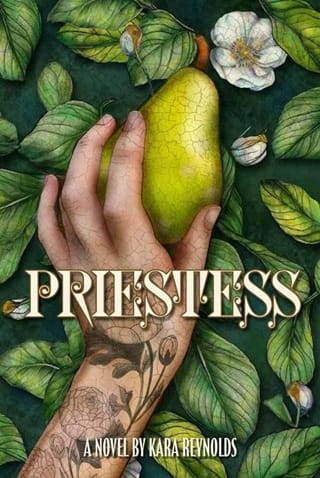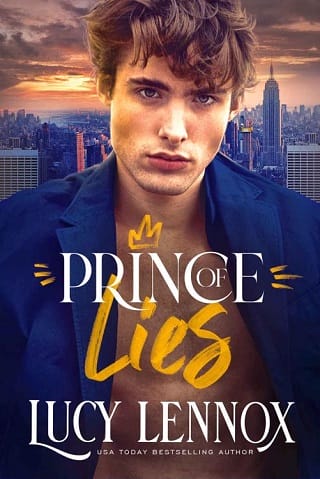15. Farmlands
Nyossa’s thinning trees were our sign that our days in the forest were behind us.
As the sun set, farming land made itself more and more apparent on either side of the road, sparse fields of wheat, barley, oats, potatoes, sugar beets.
Some of the fields held paddocks of sheep, cattle, goats and some had horses, all grazing, uninterested in our passing.
When we reached paddocks on either side with nothing but horses, all fine-boned and tall, Alric rode his mount to the front and spoke with Fletch and Perch.
We came to a halt and Alric, Perch and Fletch rode towards an outcropping of buildings abutting the paddocks on the right side of the road.
Mischa had guided her stocky roan towards me and Helena, Maureen behind her, eyes peering over at her mother.
“Why are we stopping?”
“Night is nearly upon us.
We have to be sleeping here,”
I guessed, hoping I was right.
Another day on horseback, even being able to have the cushion of Nash’s saddle, was wearing on me.
Perch, at a canter, rode his horse back towards our party.
By now we had all pulled up along the side of the road in clusters of three and four horses, so we all heard him when he said, “The women can ride all into the nearest barn.
Wait there.”
The men seemed to know where to go and rode ahead to another building.
As instructed, we pulled off the road and down a dusty little trail to the closest barn, which appeared to be a stables.
Fletch met us inside and one by one, removed our mounts’ tack and saddles and stabled them along with other horses.
We stood in a group and waited.
Perch walked into the stables and helped Fletch finish with the horses.
Then he turned to us and said, “You’ll be fed shortly.
You’ll sleep here tonight.
This is officially Tintar territory.
If you run there is really nowhere for you to go.
Stefan and Tristan are outside guarding the barn anyway.
We will not cuff you again tonight.”
He looked up above us to a loft accessed by a ladder.
“The hay bales should be a damn sight more comfortable than the ground.”
“How gracious,”
said Mischa.
I saw Perch roll his eyes.
He and Fletch walked outside.
River spun in a slow circle.
“This is a Sibbereen horse farm.”
“Wait, you mean the island?”
asked Bronwyn.
“Yes, Sibbereen has the finest horses, the tallest and strongest.
But they only sell to Tintar.
If anyone else on the continent wants a Sibbereen steed, they have to find a Tintarian willing to part with theirs.
And if they do, it is with much coin.”
Sibbereen was one of three known large island countries off of Tintar’s coast, Sibbereen, Ruskar and Vyggia.
Sibbereen bred horses and farmed rare, long-lasting spices like cinnamon and pepper.
The fertile soil of Ruskar, the largest of the islands, grew all of the grapes used to make wine in the known world, as well as contained substantial forests of saltwater oak, a hearty tree that grew up out of rocky soil and provided all the timber to make Tintarian vessels.
Vyggia produced the majority of salt for the continent, their scattering of islands stretching far out into the sea, containing expanses of shallow salt beds, each a concentration of salt, where seawater pooled.
This was safer than mining for salt.
Vyggians then crystallized the concentrations of seawater and shipped it from their larger, more developed isles.
Some referred to these nations as The Flavored Three, as they provided resources to make our food have taste, provided salt to keep our meat and traded in wine to drink.
“The owner of this farm must be wealthy,”
continued River.
“To start such a venture.
A Tintarian would need to purchase several Sibbereen sires and many dams to make his business that of selling horses.”
“It is likely,”
surmised her lover, “this started with one sire and one dam generations ago.
This is wealth that grows only steadily.”
“Oh look,”
cooed Catrin, peering over one of the stall doors.
We crowded around her to see a dappled white and gray broodmare and an awkward foal of similar coat, stumbling beneath her, searching for a teat.
Mischa and I looked at each other.
We had alerted the men about the need for a preventative tonic, but were we close to a village yet?
We walked from stall to stall looking at each horse, jealous of their gleaming coats and clear eyes.
The animals were friendly and docile, meeting us over the stall doors with a nudge of their nose or a toss of their head.
We were thus engaged when Stefan came inside with a large burlap sack in one hand and a pail in the other.
The smell was intoxicating.
The sack contained enough fresh bread rolls so that each of us could have two.
The pail was full of chilled, smoked fish with a sticky herbal rub.
Catrin’s eyes where shiny.
“I never thought warm bread could make me cry.”
We stood around the sack and the pail, not bothering to sit as we pawed at the food, the highest quality food we had had in two weeks.
The fish had been seasoned with garlic, rosemary and a savory, bright green herb I had never tasted.
The stickiness of the meat caused us all to keep licking our fingers after each piece of fish.
Fish were hard to come by in Eccleston.
Our meat tended towards beasts and poultry as our water was pumped from the earth via wells, not collected from a stream.
Mining country did not hold many sources of water above ground.
Even Helena made an effort to eat her fish and bread, eyes closed as she chewed.
There was appreciative mumbling around me.
I noticed Bronwyn giving Eefa part of her share of the fish.
She had a look of expectancy on her face.
“You don’t have to do that,”
groused Eefa.
“Yes, I do, girl.
At this age, I’m not as hungry as I was once.
You need to eat.”
Eefa hesitated and then took the fish from her mother’s hand.
One by one, we crawled up the ladder into the loft, pushing hay bales into makeshift beds.
Catrin, Eefa, Bronwyn and Maureen all fell asleep quickly.
Helena leaned against me as we sat on a bale.
Mischa pushed a bale flush up against ours and sat on Helena’s other side, taking her hand.
Quinn and River sat nearby.
I saw that they held hands.
“That Eefa is determined to be difficult,”
said Mischa.
“Even about fish.”
“That child is with child,”
said River.
All of us paused with surprise, even Helena lifted her head a little.
“You cannot be serious,”
breathed Quinn.
“She is barely sixteen.”
River nodded.
“Which means she probably got with child at fifteen.”
“How do you know this?”
Mischa said.
“I spoke with Bronwyn a few nights past,”
River explained.
“The girl was sleeping.
And Bronwyn is not her mother.
She is her grandmother.”
“That certainly makes more sense,” I said.
Our voices were hushed, the pink of the sun’s waning casting little light through the lone window in the loft.
The horses nickered below us.
“Bronwyn’s daughter got herself with child by a miner who came to the city on holiday, but left without giving her his true name,”
River went on.
“So she had Eefa without knowing who her man really was.
And the daughter died of a winter chill shortly after the birth.
And Bronwyn’s husband died that winter of the same chill.
So Bronwyn has raised Eefa all on her own for all this time.
And ran their hatchery, raised the chickens and sold the eggs all by herself.
Twas a rough life for both of them.”
“And now this,”
I sighed, waving a hand vaguely around us.
“And who is the father of Eefa’s child?”
asked Mischa.
River shrugged.
“The girl will not say.”
 Fullepub
Fullepub 



